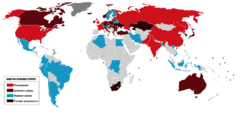april  2008
2008
Last week, CBS News reported on the rates of suicide and attempted suicide among veterans returning from Iraq and Afghanistan, stating that estimates provided to them last fall by the Department of Veterans Affairs were drastically low. Back in November, CBS had posted statistics from 2004 and 2005, the most recent information available, indicating that suicide rates among veterans were roughly double that of the civilian population. This week, leaked emails from the VA suggest that there were 12,000 reported suicide attempts in 2007 — roughly twice what was previously believed.
The American Psychiatric Association, today, is announcing the results of their most recent study of currently enlisted troops, which found that around 60% would not seek mental health care even if they felt they needed it, due to fear for their jobs, stigma, etc.
Meanwhile, a RAND Corporation study released earlier this month reported that one third of all veterans suffer from post-traumatic stress syndrome, depression, traumatic brain injuries or a combination of all three. They also admit that, due to reluctance to report mental health problems, the numbers could actually be much higher. Here's an excerpt (italics are mine):
"An estimated 31 percent of troops returning from Iraq and Afghanistan have a mental health condition or reported experiencing a [Traumatic Brain Injury]. [O]f the 1.64 million deployed to date, the study estimates that approximately 300,000 veterans... are currently suffering from PTSD or major depression, and about 320,000 may have experienced TBI during deployment." — Invisible Wounds: Mental Health and Cognitive Care Needs of America’s Returning Veterans (RAND Corporation)
 So, what kind of mental health services are available to the veterans who are actually willing and able to ask for help? That is bound to become one of the most important health care questions facing the US in the coming years, not just for the sake of the 1.64 million, the spouses awaiting their return and the children currently growing up without them, but for the sake of all the communities into which these men and women will be expected to smoothly reintegrate. (Yeah, assuming they pull out of Iraq.)
So, what kind of mental health services are available to the veterans who are actually willing and able to ask for help? That is bound to become one of the most important health care questions facing the US in the coming years, not just for the sake of the 1.64 million, the spouses awaiting their return and the children currently growing up without them, but for the sake of all the communities into which these men and women will be expected to smoothly reintegrate. (Yeah, assuming they pull out of Iraq.)
I could find no statistics on the number of veterans who are being treated with SSRIs but it's reasonable to expect that antidepressants would be the first line of defense for an overburdened, under-funded health care system. This seems to be confirmed by statements like this one from the National Center for PTSD:
"Findings... have demonstrated that SSRI treatment is clearly effective... for combat veterans suffering with PTSD. We recommend SSRIs as first line medications for... men and women... who have experienced a variety of severe traumas... major depression and panic disorder. Additionally, the side effect profile with SSRIs is relatively benign... although arousal and insomnia may be experienced." — Treatment of the Returning Iraq War Veteran (National Center for PTSD)
Never mind that "arousal and insomnia" (as side effects go, nearly as common as nausea and dry mouth) could actually be among the worst side effects for someone suffering from PTSD, considering that sleep deprivation comes with its own set of potentially devastating mental health side effects, including hallucinations, paranoia, short temper and loss of impulse control. Hmm, just what combat veterans need when they're trying to adjust to the "peace and quiet" of home with an estranged spouse and babies that never seem to shut up...
And never mind the fact that in 2004, after nearly a decade of lawsuits and increasing pressure from victims' families, the FDA finally issued a warning about the alarming side effects associated with SSRIs. That warning was belatedly but significantly amended in May 2007 to include children, adolescents and adults aged 18-24 — and thus, a large proportion of Iraq war veterans. Now carried by all SSRIs (e.g. Prozac, Zoloft, Luvox, Celexa and Paxil), the updated warning clearly states:
"Antidepressants increased the risk compared to placebo of suicidal thinking and behavior (suicidality) in children, adolescents, and young adults in short-term studies of major depressive disorder (MDD) and other psychiatric disorders."
"Patients, their families, and their caregivers should be encouraged to be alert to the emergence of anxiety, agitation, panic attacks, insomnia, irritability, hostility, aggressiveness, impulsivity, akathisia (psychomotor restlessness), hypomania, mania, other unusual changes in behavior, worsening of depression, and suicidal ideation [and] to look for the emergence of such symptoms on a day-to-day basis, since changes may be abrupt."
Right. Just what the long-suffering spouses, children and parents of returning veterans need; to welcome their loved ones home from hellish combat in the desert, only to find themselves living with the same kind of hypervigilance and paranoia, sleeping with one eye open and walking-on-eggshells in their own home that the veterans themselves are dealing with as they lie awake; aroused insomniacs who, instead of feeling relief that the threat of death no longer hangs over them every day, they find themselves faced with the new and infinitely more terrible fear of the threat they might now pose to themselves and those around them.
For more on the terrible history of antidepressants, read Richard DeGrandpre's 2001 article "The Lilly Suicides" and his 2004 follow up piece, written just after the first warning was issued by the FDA.
It's funny, just last week someone on Bill Maher's show was asking what Ron Paul is doing with all the millions he received in contributions, now that he's withdrawn from the Presidential race. Well, today we got our answer: CGI. Check out his new commercial, posted by AlterNet's Joshua Holland, who comments that Ron Paul, although "scary" on a number of issues (among which, health care and abortion top my list of "deal-breakers"), is singularly effective at articulating an "accessible critique of American militarism."
He's also got a special place in my heart for admitting to the unconstitutionality of income taxes and openly condemning the Federal Reserve system. Most of all, I love the way he calls US rationalizations for war for what they are: imperial ambitions, bypassing the bullshit about "protecting American interests" that's so deeply engrained in our political rhetoric it's often parroted not just by corporate spokesmodels on cable news networks but even by the progressive media.
 Ron Paul aside, Holland's use of the phrase "Max Headroom-like" to describe the commercial made my day (and provides me with a logical segue). I recently came to the conclusion that Keith Olbermann is MSNBC's Max Headroom — and, in case it's not obvious, I mean that in the most complimentary way imaginable.
Ron Paul aside, Holland's use of the phrase "Max Headroom-like" to describe the commercial made my day (and provides me with a logical segue). I recently came to the conclusion that Keith Olbermann is MSNBC's Max Headroom — and, in case it's not obvious, I mean that in the most complimentary way imaginable.
 First, there was simple and unavoidable fact that his views and venom seemed so much at odds with everything his network stands for that his continued existence in such an unrestrained, antagonistic state seemed to defy the very laws of physics as we know them (or at least, as Popular Mechanics would have us believe them).
First, there was simple and unavoidable fact that his views and venom seemed so much at odds with everything his network stands for that his continued existence in such an unrestrained, antagonistic state seemed to defy the very laws of physics as we know them (or at least, as Popular Mechanics would have us believe them).
Unable to shake my skepticism, I watched for some telltale sign that Olbermann was nothing more than a "designated dissenter" (in the tradition of the 1976 film "Network") who, for all his rage, was under the complete control of the cynical, calculating media conglomerate that created him. I went so far as to troll around the Internet for some salacious evidence, implication or even baseless rumor that might point to the deeper, sleazier truth about his origins and objectives.
But I found nothing of the kind and, after watching Bill Moyers interview him, I was forced to conclude that Olbermann is most likely what he appears to be; an alarmingly humanlike simulation, representing the cutting edge of artificial intelligence technology and embodying all the latest datamined demographic preferences of the network's target audience, down to the last detail.
He has the intelligence of a Donahue, the sincerity of a Brokaw, the wit of a Dennis Millar and the Ken dollish good looks of an Anderson Cooper with the Grecian Formula plug-in. Most importantly, though, he has the moral indignation of an entire underrepresented — and at least since the death of grunge and the dot-com crash, economically under-exploited — generation. Until it's proven otherwise, I'll take comfort in the fact that he wields his eloquence and outrage as powerful weapons for the good — and we can only hope that he continues to use them to mobilize the masses.
In Keith Olbermann's interview with Hillary Clinton yesterday, he asked her to clarify a statement she had made in last week's debate on ABC regarding a "hypothetical Iranian attack on Israel, " in which she proposed "an umbrella of deterrence [to] make it clear to the Iranians that an attack on Israel would include massive retaliation from the United States," adding ominously that she "would do the same with other countries in the region." Her statement failed to elicit any follow-up questions from the moderators who were apparently too busy reformulating gossip from Fox News into questions for the candidates to pick up on Clinton's sudden ideological lunge to the right.
After the debate, Keith Olbermann had speculated about the meaning of her rather extreme proposal; "This is far further to the right than John McCain. This may be far further to the right than the Bush administration policy about the Middle East, which you didn't think was physically possible. Who on Earth, from that political point of view, could she be appealing to with this?"
What's truly incomprehensible is that her statement has gone largely unchallenged — in fact, unquestioned — not only by the muppets at ABC but by her opponents. Obama's restraint in the face of Clinton's unorthodox campaigning in Pennsylvania was gentlemanly — he took the high road while she downed her beer and shots of Crown Royal and fondly reminisced about a gun-happy girlhood in Arkansas. Considering the ludicrous spectacle she's been making, perhaps a response from Obama seemed unnecessary but, as someone wise once said, no one has ever gone broke underestimating the intelligence of the American people. But I'm getting ahead of myself...
Back to Keith Olbermann, who had the chance to question Hillary yesterday on a number of issues, including her comments in the debate. Her answer follows (the italics are mine):
"Well, what we were talking about was the potential for a nuclear attack by Iran. If Iran does achieve what appears to be its continuing goal of obtaining nuclear weapons... What our policy should be is to make it very clear to the Iranians that they would be risking massive retaliation were they to launch a nuclear attack on Israel. [I]f Iran were to become a nuclear power it could set off an arms race that would be incredibly dangerous and destabilizing because the countries in the region are not going to want Iran to be the only nuclear power... "
 So I think it's pretty clear Hillary's lost her mind. For one thing, Iran couldn't possibly become the "only nuclear power" in the region since India, Pakistan and Israel are also "in the region" and all have nuclear weapons. Right next door to the region are Russia and China, also members of the "nuclear club," making the region the reddest in the world on the nuclear state map (courtesy of Wikipedia). This is beyond baffling. Either she's gone stark raving bonkers, or she "mis-spoke" again, or she's clueless about the geography and military capabilities of several nations in the most dangerous region in the world, or she's boldly taking "underestimating American intelligence" to a level of contemptuousness surpassing even Dick "so what" Cheney.
So I think it's pretty clear Hillary's lost her mind. For one thing, Iran couldn't possibly become the "only nuclear power" in the region since India, Pakistan and Israel are also "in the region" and all have nuclear weapons. Right next door to the region are Russia and China, also members of the "nuclear club," making the region the reddest in the world on the nuclear state map (courtesy of Wikipedia). This is beyond baffling. Either she's gone stark raving bonkers, or she "mis-spoke" again, or she's clueless about the geography and military capabilities of several nations in the most dangerous region in the world, or she's boldly taking "underestimating American intelligence" to a level of contemptuousness surpassing even Dick "so what" Cheney.
Furthermore, implying that Iran is still pursuing nuclear weapons months after the reports came out, amounting to a consensus in the intelligence community, that there's no evidence of that, puts her in a small — in fact, shrinking — circle of Republican fanatics that includes President Bush, Dick Cheney and John McCain. She was quick to criticize Obama when he uttered some silly, complimentary words about Reagan a while back; now she's poised to dust off Ronnie's Cold War strategy of "mutually assured destruction?"
Finally, Keith Olbermann ended his interview with Clinton on a question about her recent meeting with Richard Mellon Scaife, billionaire owner of the Pittsburgh Tribune-Review and card-carrying member of the "vast right-wing conspiracy" that united politicians and press alike in attacking Hillary and her husband during Bill's impeachment and the attending scandals. Over the weekend, Clinton had accepted an invitation to meet with Scaiffe, after which he announced his endorsement of her; in light of past history (or should we say, Living History?) Olbermann asked her why.
 He was only halfway into the question when Hillary started laughing — you know, that high, nervous, forced laugh that some have characterized as a "cackle?" Now I won't jump on any bandwagon that's also carrying Bill O'Reilly and Sean Hannity but I will say that it's one of the most unnatural, off-putting laughs I've ever heard. The timing of her outbursts, if not completely random, is always vaguely inappropriate — often in response to (or anticipation of) a question that puts her on the spot — never to something funny. It just looks bizarre, like she's being poked by someone off camera with a stick — maybe a stick of Men's Pocky (the funniest kind of stick I can think of).
He was only halfway into the question when Hillary started laughing — you know, that high, nervous, forced laugh that some have characterized as a "cackle?" Now I won't jump on any bandwagon that's also carrying Bill O'Reilly and Sean Hannity but I will say that it's one of the most unnatural, off-putting laughs I've ever heard. The timing of her outbursts, if not completely random, is always vaguely inappropriate — often in response to (or anticipation of) a question that puts her on the spot — never to something funny. It just looks bizarre, like she's being poked by someone off camera with a stick — maybe a stick of Men's Pocky (the funniest kind of stick I can think of).
When she first started doing the laugh a few months ago, I thought it was the result of some really bad advice from a well-meaning "image consultant" attempting to soften and feminize her. But I can no longer believe that because no politician worthy of the name would continue to employ such a badly received, transparent tactic and it isn't remotely plausible that she missed it when every news (and fake news) outlet had their fun with it. The only possible explanation is that she's fully aware of the effect and she's now using it as an offensive weapon, a conversation-stopper designed to stun and disorient her opponents, like Bill O'Reilly's "Shut up."
A couple of years ago, I came across something called Death and Taxes, an exceptionally concise, visually eloquent example of "information design," both eye-catching and eye-opening. In a single panoramic image, it showed the comparative sizes of each branch and tributary of the US federal budget and gave a precise breakdown of government expenditures approved by Congress.
The other day, I was searching for the artist's name so I could reference it here when I made the happy discovery that a brand-new 2009 version had just been posted. In addition to the comparative budget allocation illustrated by the size of each circle, there is now a tiny number next to the dollar amount of each budget item (a detail that was absent in 2004) indicating the percent change from the previous year; increases are in green, decreases in red. I think every school, newsroom and post office in America should be required to display this at eye level.
"Death and Taxes 2009 is a large representational graph of the federal budget [which] contains over 500 programs and departments, includes their budget total and percentage change from the previous year. The data is straight from the president's 2009 budget request and will be debated, amended, and approved by Congress to begin the fiscal year."
The other night we watched Jimmy Carter Man from Plains, a 2007 documentary about his recent book tour for "Palestine: Peace Not Apartheid" and the criticism he's faced over its message and, it seems, even more often, its title. The movie is full of scenes that make you cringe at people's level of ignorance, not least of all the journalists, who are often seen asking confrontational questions based on the book's title alone; more than once, you see Carter having to patiently explain his choice of words to someone who is obviously unclear on their dictionary definition. Frequently, this takes up all the time allotted to the interview, conveniently avoiding any further discussion of the book's contents. You come away with the impression of Carter as one of the most patient, honorable men in modern history — and downright saintly for an ex-President.
This week, Jimmy Carter is continuing his lifelong quest to broker peace in the region by meeting with Palestinian leaders, including the leader of Hamas, in the West Bank. He's being criticized by not only the current White House but also by all three Presidential candidates who, regardless of their own beliefs or intentions, understand that showing even a hint of independent thinking on the Israel-Palestine issue is no way to win an election. Now the Israeli government is refusing to allow Carter to visit Gaza and they've actually declined to provide security for his delegation, which is — I hesitate to say ominous — but, at best, worrisome. Let's all think bulletproof thoughts in their direction.
As for the Presidential campaign, I can't believe we have six more months of this shit to look forward to. The one thing I am enjoying is the way Obama seems to just get better and better at deflecting the increasingly ugly attacks from both Clinton and McCain. Every time you think, Ooh, that's going to hurt him; the next thing you know, he's turning their own words against them and making them look like the desperate, vicious lifetime politicians that they are.
I mean, really; first, McCain commemorates MLK day by standing on the balcony where the man was assassinated, surrounded by security guards, apologizing for his "lateness" in supporting the bill for a national holiday; now we have Hillary's sad attempt at bonding with blue-collar voters in Pennsylvania by acting like she's all down with "hunting and sport shooting." Americans might not care for "elitists" but I'm thinking they might care for condescending hypocrites even less.
It's like Jon Stewart said after Obama's big post- Reverend Wright speech; "at 11:00 on a Tuesday, a prominent politician spoke to Americans about race, as though they were adults." I guess I continue to marvel that it's working. I found this at Democracy for Vancouver, based in the other Vancouver (WA). It sums things up nicely too:
 Does anyone else get this feeling every time April rolls around that you're just bracing yourself for the next catastrophe to break into your regularly scheduled program? I'm not even talking about personal catastrophes, although I've had just enough of those to approach April with dread; in fact, last weekend was the anniversary of one such event. It was a cold, overcast April morning three years ago when our kitty, Shay, with whom we are ridiculously in love, thought she could fly and dove off our 9th floor balcony in pursuit of a screeching seagull that had been circling with its mates unusually close to our building.
Does anyone else get this feeling every time April rolls around that you're just bracing yourself for the next catastrophe to break into your regularly scheduled program? I'm not even talking about personal catastrophes, although I've had just enough of those to approach April with dread; in fact, last weekend was the anniversary of one such event. It was a cold, overcast April morning three years ago when our kitty, Shay, with whom we are ridiculously in love, thought she could fly and dove off our 9th floor balcony in pursuit of a screeching seagull that had been circling with its mates unusually close to our building.
Miraculously, she survived, but it wasn't until mid-May that we were at all certain of that outcome. Remind me to document the entire story some time soon, 'kay? Because, like I said, I'm not even talking about personal catastrophes here. The month of April has historically seen more than its share of disasters (that'd be... 1/12th, right?). Here's a list off the top of my head (seriously — when I have to check wikipedia, I'll let you know)...
- Okay, April 1912, RMS Titanic sinks, beginning the mother of all big-budget disaster franchises.
- April 1994, the Rwandan genocide claims 500,000+ lives.
- Also in April 1994 (but no excuse for overlooking the former), Kurt Cobain commits suicide.
- 1995, the Oklahoma bombing shakes the midwest out of an otherwise pleasant rainy season.
- On a related note, in April 1993 (these will be listed in, uh, synaptic order), 80 Branch Davidians are murdered in Waco, Texas when the FBI and DEA conveniently overlook the first part of the first amendment ("freedom of religion"), their own rules of engagement and several other (some would say higher) laws.
- 1999, the Columbine tragedy sets the record for casualties (13) in a school shooting until...
- 2007, the Virginia Tech tragedy sets a new record with 32.
- 1968, MLK assassinated.
- 1986, Chernobyl disaster.
- (Okay, it was around here that I had to consult the ol' wikipedia but that was a pretty good start.)
- 1906, San Francisco is devastated by earthquake and fire.
- April 1965 & 1974 are record-breaking months for destructive tornadoes in the midwest.
Well, this has been fun...

